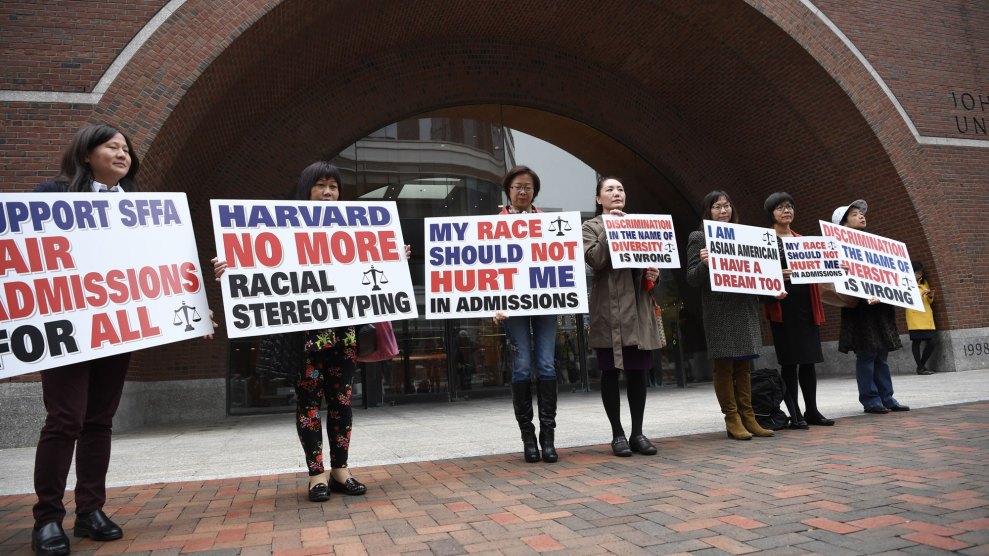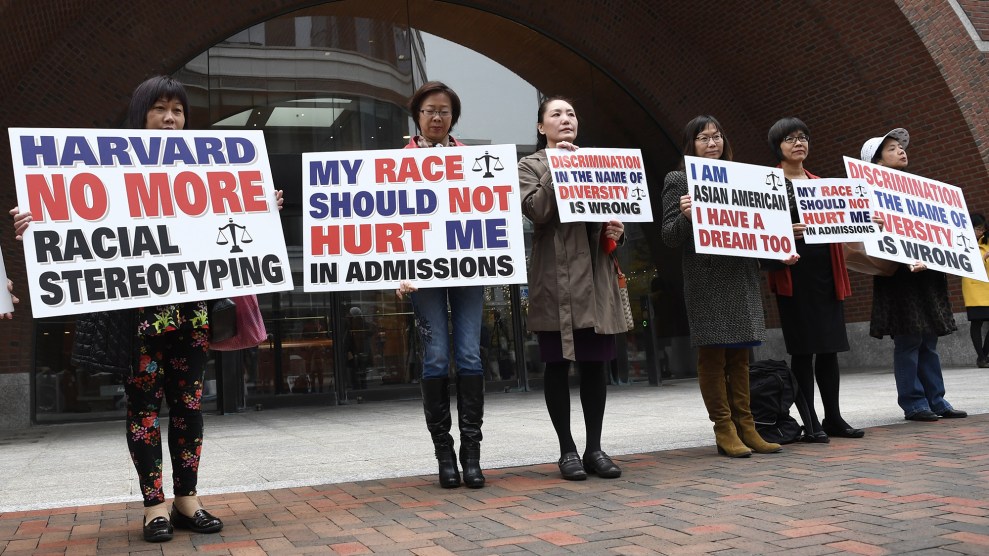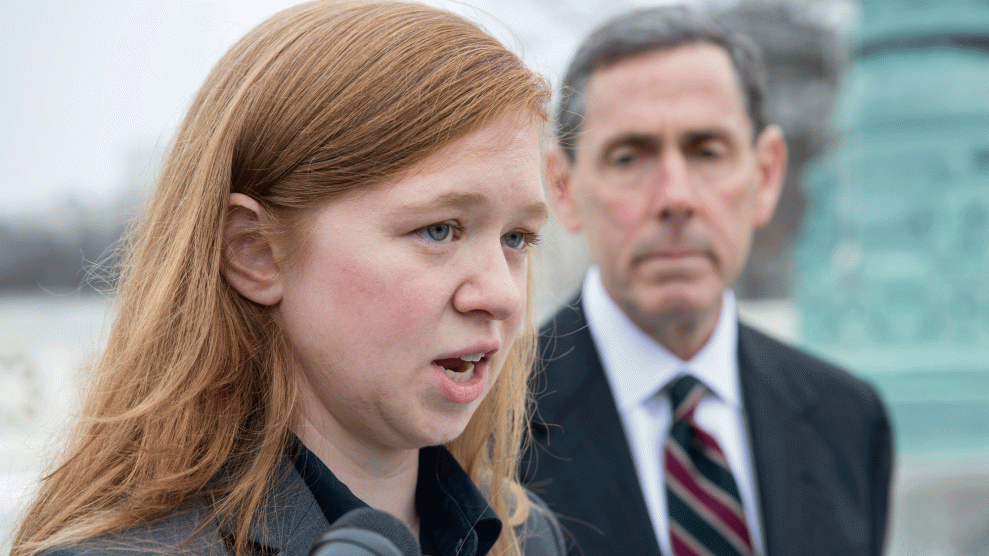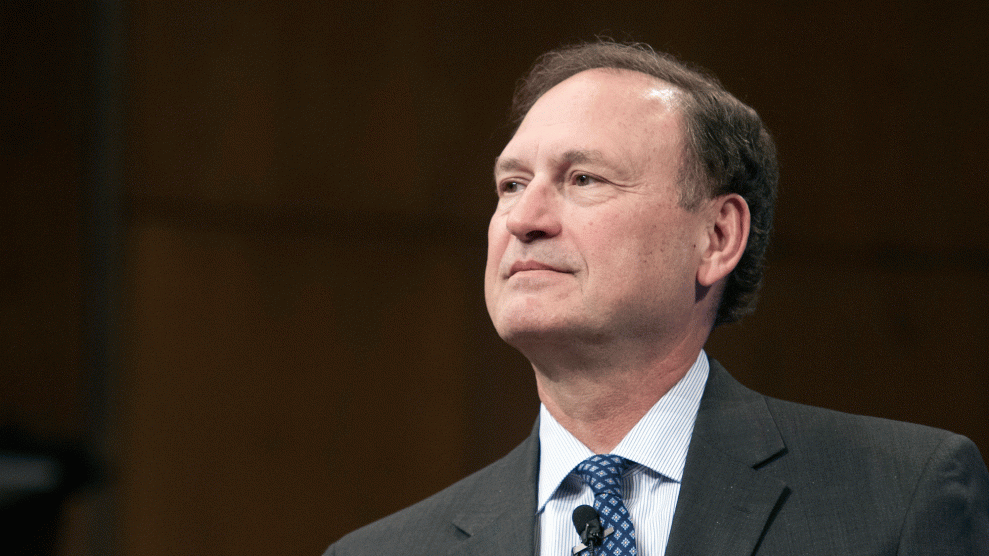
Demonstrators hold slogans in front of a Boston federal courthouse in October 2018 when a lawsuit charging Harvard University of discriminating against Asian American applicants in admissions went to trial. Liu Jie/Xinhua/ZUMA Wire
Prop 16 in California would overturn the state’s ban on affirmative action programs in public institutions. The opposition to the measure has been led by a familiar constellation of people in the long-running, multi-front push to undermine affirmative action programs. And like a lot of other recent efforts, the opposition also includes a number of Asian Americans.
How many shouldn’t be overstated—polls show Asian Americans are still broadly supportive of affirmative action. But the politics of being Asian in America right now are not so simple, imbricated as they are with matters of class, which is itself bound up in factors like country of origin and generational differences. Ellen Wu, author of The Color of Success: Asian Americans and the Origins of the Model Minority and the forthcoming Overrepresented: The Surprising Story of Asian Americans and Racial Justice, points out that right-wing activists have opportunistically seized on one common thread in the Asian American experience. “In some ways Asian Americans often feel invisible,” Wu says. “Regardless of where people fall politically on issues, there is a shared sense among Asian Americans that we’re overlooked, that we’re considered unimportant. I think these white conservatives are recognizing that.”
I spoke with Wu about Asian Americans who oppose affirmative action, the evolution of affirmative action from a program of compensatory justice to a program of diversity, and the invention and constant reinvention of “Asian American.” The transcript below has been lightly edited for length and clarity.
Why does a vocal group of some Asian Americans oppose affirmative action, even though it benefits all?
There’s some really important research being done by social scientists, such as Janelle Wong and Karthick Ramakrishnan, who have been following the elite college admissions issue going back to about 2013. They have made very clear that we’re talking about a distinct numerical minority of Asian Americans. Most Asian Americans are indeed supportive of affirmative action. The question is, why is it that there is this very vocal minority that’s been gaining a lot of traction and attention and has actually been quite effective at this political mobilization? There is some historical context that helps us to understand that. First, between World War II and the 1960s, the public image of Asian Americans did a 180 in American culture. They went from being thought of as the “yellow peril,” “brown hordes,” and “forever foreigners” to being lauded as the “model minority.” At that time, that meant that they were loyal to the United States, anti-Communist, but also subscribers to what we might call conservative family and cultural values. We saw a lot of stories circulating in popular media that, for instance, Chinese families really upheld strict gender norms. Their children were well behaved, they loved to study, they had a reverence for their elders, they didn’t get into trouble. They were not juvenile delinquents, as people have talked about at the time.
By the 1960s, social scientists, journalists, and political leaders observed that Asians, specifically Japanese and Chinese Americans, the two largest Asian groups at the time, seemed to be doing pretty well, despite a history of discrimination and racism. That could be explained by both their reverence for family values and because they weren’t out in the streets protesting and making trouble. So this was very much comparison to the African Americans and the ongoing Black freedom movement and how troubling that movement was to a lot of white folks.
There’s this turning point in the late 1960s. What a lot of people aren’t aware of is that among all of those social movements and that social upheaval of the ’60s, Asian Americans, in fact, had their own Asian American movement. And that movement was very much an anti-racist movement and anti-imperialist movement. Its two inspirations were Black Power and the anti-Vietnam War movement. What we see is a lot of young folks rising up, essentially rebranding themselves from “Orientals” and “model minorities” to Asian Americans, which is the name they came up with for themselves. That was very much an anti-racist, anti-imperial political identity that they mobilized.
At one level, we have these grassroots movements in ethnic neighborhoods, on college campuses, in Asian communities. What we start to see at the federal level and some state government level is a response to the Black freedom movement. And that’s affirmative action.
Affirmative action itself is like an experiment. It’s not like it emerges as a suite of policy reforms fully formed, but it lurches in fits and starts. Affirmative action, first and foremost, started as a way to figure out how to move the nation closer to achieving equality and freedom for Black folks. But it introduced this fuzziness. Affirmative action built policies around this category of “minorities.”
But who are these minorities officially by the state. How are they treated by the government? Who gets to decide? With the late ’60s and early ’70s, Asian Americans at the time are aware that there are these new policies and programs being made available to minorities who have suffered a history of racial discrimination and injustice, and Asian Americans believed that they fit that bill. So they mobilize and act to persuade policymakers that they ought to be included in affirmative action–type programs. The problem that they come up with is that because they’re already starting to be thought of as a so-called model minority, policymakers and decision-makers, whether that’s in the federal government or at universities or even in the courts, they’re not always persuaded by Asian Americans’ claims that they should be included in affirmative action. So there is this ambiguity or tension. There’s this question of whether Asian Americans are “model minorities,” or are they, as they would consider themselves, “beleaguered” minorities that are entitled to what I would call compensatory justice—you know, affirmative action?
There are gains in that direction that Asian Americans make. They compel the federal government to recognize them as “Asian Americans.” That’s a big win. That category itself did not even exist before the 1970s as official government policy. So Asian Americans, because of the work that they’re doing, achieve a level of recognition by government authorities by the end of the 1970s. But their status as “minority” is unresolved.
In 1984, the University of California decides to drop Asian Americans from affirmative action in admissions. So admissions does become, with the Bakke case along with employment, one of these major areas of concern when it comes to affirmative action. Asian Americans just find very unevenly that they are sometimes considered minorities in the same way that African Americans and Latinx folks. But sometimes they’re not. It’s that unresolved question. On one level, there’s a general recognition that Asian Americans are not white, that they’re not considered white in the census and everyday interactions. We’ve seen that with COVID and some anti-Asian racism, but in terms of affirmative action and diversity, policy and programs, it’s a lot less clear. It’s very fuzzy and very messy. That fuzziness helps us understand why it is that Asian Americans, some Asian Americans, might be opposed to affirmative action because they don’t think it benefits them.
In the 1960s, the Immigration Act was passed, and that opened the door for Asian migration to the United States. In a country that explicitly excluded them, you have the floodgates open. How did that influence where Asian Americans felt their place was within the US racial hierarchy?
That’s actually very important, too. In 1965, when the United States reformed its immigration system, an unintended consequence is that it really opens the doors to mass immigration from Latin America and the Caribbean and Asia. Members of Congress did not think this was going to happen, but it did. For Asians, in particular, the “new immigration” after 1965—a lot of that was folks who had skill sets that the United States thought would benefit its economy, which at that time was moving from industrial production to post-industrial—more like a knowledge-, service-based economy.
A lot of them are like my own father, for instance, who first came to the United States as a graduate student in the sciences—people who are trained in the sciences or health care. This is how it starts to tilt the demographic makeup of Asian Americans so that many folks are highly educated. The population itself just grows quite a bit. So that model minority idea that was already in place, even as that 1965 act was passed—it goes viral. It seems like all these new immigrants are proving the stereotype that existed already because they came with all this kind of educational capital. Residential segregation, for instance, was in the process of being dismantled. Some of these new immigrants could also move straight away to the suburbs. The United States was still segregated but they could also reproduce some of these educational privileges for their children, and then their children could enroll in colleges, and so on and so forth. Asian Americans have this demographic profile where that skews where there are definitely people on the higher end of the socioeconomic spectrum, and then people certainly on the lower end. It’s what social scientists call bifurcated. That compounds that fuzziness that I mentioned to you before, that question of whether or not Asian Americans are like a legit, bona fide minority group—minority in the sense of affirmative action policy, minority being tied to this idea of being disadvantaged.
It’s interesting that you bring up that bifurcation of who came to the United States. How did that influence who within the Asian American community winds up supporting or opposing affirmative action?
That’s a little bit harder for me to answer. The other factor to keep in mind is that affirmative action itself has evolved from its original intention, which was, in some ways, compensatory justice to make up for past wrongdoings. What it looks like today is a lot more driven by diversity outcomes, like having a certain mix of folks from different backgrounds.
I would have to defer to the social scientists on this one. I’m a Gen X type. I went to college in the early ’90s. I think that a lot of folks of my generation, especially people who have taken Asian American studies courses in college, my sense is that those kinds of generational experiences have helped to shape people’s outlook and positions on these kinds of issues. Because if you look at the people, the profile of people who are opposing affirmative action right now, they’re mostly first-generation immigrants from China. That’s my understanding. This is a very different group of people.
It’s not easily predictable how people will fall on different issues. Because I get emails every week from one of these groups that are opposed to affirmative action called 80-20. They’re supporting the Harvard lawsuits, but they’re totally opposed to Trump. So one thing that stands out to me is that the political fault lines, issue by issue, are also a bit messy and unpredictable.
For the small, vocal group of Asian American folks who are opposed to affirmative action, if the fault lines are messy and unpredictable, what is it that draws them to the same side of conservative ideologues?
One thing I have started to notice is that people just have different ideas of what racial justice means. It’s interesting. I teach Asian American history, so they repeat what they think are the talking points about Asian American history, but they spin it in a very different way. In some ways Asian Americans often feel invisible. Regardless of where people fall politically on issues, there is a shared sense among Asian Americans that we’re overlooked, that we’re considered unimportant.
I think these white conservatives are recognizing that. It’s this kind of irony there, but maybe it’s speaking to that need to be recognized. I should be very clear. I support affirmative action. I’m asking the same questions you are, and it is very interesting. I think there’s also just a lot of misinformation on social media and Chinese language social media. A lot of these folks, I don’t think they were necessarily educated and grew up in the United States. So they have a very different understanding of US history.
Historically, has there always been this vocal group that has opposed affirmative action and pushed for more of a colorblind approach?
The precedents would be local cases in San Francisco, for instance, lawsuits against particular school districts. What is clear to me, anyway, is that if we go back to the 1960s, and even before then, people who thought of themselves as Asian Americans and took positions on racial issues as Asian Americans—the overall pattern, by and large, is on the civil rights side of things. That’s the interesting shift here. And so the large Asian American organizations that are outcomes of the civil rights moment in the ’60s and ’70s have been part of a large civil rights coalition. These [opponents of affirmative action] have come more out of localized cases but shift as American society’s politics have shifted to the right. I think those shifts have attracted some individuals and then over time that has grown.
Could you tell me more about the anti-racist work Asian American activists were doing in the 1960s? To what extent were they pushing for affirmative action during the civil rights era?
Looking at in particular—and it’s still around—it’s called the Japanese American Citizens League, the irony is, in Asian American circles, they’re famous for being the group that advocated cooperating with the government during World War II and the whole concentration camp experience. So they had a bad reputation during and after World War II. But interestingly, that group was also the one group that was politically organized, especially through the ’40s, ’50s, and ’60s, in terms of initially Japanese American but then Asian American issues. They were very much a part of what we can think of as the liberal bloc of that mid-century period. They worked with groups like the NAACP, LULAC, ACLU. They supported fair employment practices, housing desegregation, school desegregation—all the big liberal issues of the day. There were some important splits in terms of immigration policy, but overall, I think that’s something people don’t know about. But it’s important to recognize that there is this history of alliances between Asian Americans and other communities of color.
I also want to recognize there was, of course, anti-Black racism. Historians will always tell you, “It was like this, but there are these exceptions.” That history did exist. The rise of the Asian American movement in the late ’60s and into the 1970s was very much an anti-racist movement in solidarity with what they called Third World communities—the term they used at the time.
I was recently looking at the Justice Department’s case against Yale, and they were arguing that Yale discriminated against Asian students, but they defined Asians as excluding Southeast Asians. Janelle Wong told the Harvard Crimson that the “Trump DOJ is manufacturing their own definition of our communities to suit their political agenda.” Historically, to what extent did that happen, this notion that the state or government defined what it meant to be Asian American?
That’s an interesting question. I’ve been looking at a lot of stuff from the ’70s, and Asian Americans were the ones to go to government agencies and say, “Hey, you need to pay attention to us.” I’ll just give you an example. In 1971, the Department of Health, Education and Welfare opened this little tiny office, what they called the Office for Asian American Affairs. It was like one or two people. But it was a landmark thing that very few people know about because, as far as I can tell, it’s the first federal agency that was dedicated to Asian American affairs in the title. There was one particular person in charge, and her name was Toyo Biddle. What I realized was that she and then the later staff folks, they had a lot of latitude in defining who they considered Asian Americans. At the time they called [Southeast Asians] “Indo-Chinese refugees,” that is refugees from Vietnam and Southeast Asia. Once they started coming to the United States in 1974, 1975, the folks in this office decided that those refugees, their issues should be part of the purview of this office. They had a very expansive understanding and an inclusive definition of who counted as Asian American. They also pushed the US Commission on Civil Rights to have their first hearings on Asian American issues in 1973, and in these interactions, Samoans were part of the groups that attended and participated in the hearings.
So I think the Asian Americans who were working on Asian American issues defined themselves in a very broad way from the beginning. And I think what they thought connected them all was that they all lived through histories of racism and also US imperial domination.
When we talk about affirmative action, how inclusive is the definition of who is considered “Asian”? And to what extent do Asian Americans get to control how they’re defined?
I think it depends on who you ask. There’s definitely some strategizing going on. And there are the folks who are opposed to affirmative action who are also opposed to what they called data disaggregation because they think that disaggregating data will disadvantage their children in the admissions process. So the folks on that side seem to be opposed, they have their way of thinking about who counts as Asian American.
It does speak to the fact that [Asian American] is an invented category, and it just becomes more complicated over time, because it’s so diverse. And there’s new migration and refugees from different places. So it’s like this constant process of reinvention and coalition building. On the progressive side, people have tried to approach it in an expansive way. But there’s also pushback on that. And in the sense that I think a lot of people feel like when people use that term, “Asian American,” people seem to mean East Asian rather than Southeast Asian or South Asian or Pacific Islander. It’s also this invented thing that doesn’t feel natural.
So I’m looking at these affirmative action cases brought by Edward Blum in the past few years—first against the University of Texas. It had a white plaintiff. It didn’t work. So now he goes about recruiting Asian American plaintiffs in another battle against Harvard University. In the Harvard case, Asian students are still a sizable part of the student population, but they’re still making this claim that they’re being discriminated against. So it speaks to this question of, why is there this connection between whiteness and Asian groups? How have Asian Americans benefited from that closeness to whiteness?
If we look at anti-Black racism, and we see the horrific scale of it, and how it’s so deadly, I think that’s pretty clear that because Asians are not racially cast in the same way as Black folks in this country and haven’t had that same history of dehumanization. We benefit literally because we don’t suffer from the same dangers just walking on the street, driving, shopping. We are not vulnerable to the same level of systemic violence. So, to me, that’s a pretty clear benefit.
I know there are researchers who have looked at how Asian students are treated in schools and are also given the benefit of doubt and are assumed to be good students. And so there’s that kind of stereotype—they’re assumed to be good students and then that benefits them educationally.
Do you think this closeness to whiteness will influence how we think about affirmative action going forward?
I don’t know. 2020 has really changed things, you know? I think the anti-Asian racism related to COVID has made it very clear that Asians are seen as very different and not white. And I think this whole national reckoning with anti-Black violence has gotten a lot of Asian Americans thinking about it, talking about it, acting on it. I’m not in the business of predictions. We’ll have to wait and see.


















